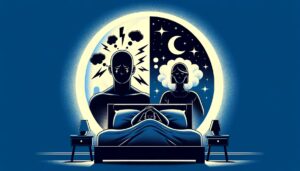Sleep is not just a nightly necessity but a pillar of good health, impacting everything from our daily functioning to our long-term wellbeing. This guide is designed to help you craft a sleep routine that not only simplifies your night but enhances your life. Ready to sleep better and live better? Let’s get started.
Laying the Foundation for Better Sleep
Evaluating Your Current Sleep Habits
Do you often find yourself tossing and turning at night, struggling to catch those elusive Z's? You're not alone. Many face sleep disruptions, like insomnia or feeling groggy upon waking up, which can significantly affect your mood, productivity, and overall health. Here’s how understanding your sleeping patterns can set the stage for improvement:
- Identifying Issues: Pinpoint what's keeping you from a good night's sleep, be it stress, anxiety, or an uncomfortable sleeping environment.
- Connection to Health: Poor sleep can contribute to various health issues, from weight gain to decreased cognitive function.
Addressing these sleep challenges is the first step toward reforming your nightly routine. Now, let’s see how setting the right mood before bed can make a world of difference.
Creating a Bedtime Routine That Works
A consistent bedtime routine can be a game-changer for sleep quality. Structuring your pre-sleep activities can prepare your mind and body for a restful night:
- Set a Schedule: Aim to go to bed and wake up at the same time every day to regulate your body's internal clock.
- Pre-Sleep Activities: Engage in calming activities like reading a book or taking a warm bath to signal to your body that it’s time to wind down.

Optimize Your Sleep Environment
Creating the perfect environment for sleep can significantly enhance sleep quality. Consider these essential factors to transform your bedroom into a sleep sanctuary:
- Comfortable Bedding: Invest in high-quality mattresses and soft, breathable sheets.
- Ideal Temperature: Keep your bedroom cool, ideally between 60-67 degrees Fahrenheit, to promote better sleep.
Key Elements to Improve Sleep Environment:
- Temperature control: 60-67 degrees Fahrenheit
- Comfortable bedding: Soft, breathable materials
- Minimal Noise: Consider white noise machines or earplugs if needed
- Dim Lighting: Use blackout curtains or low-wattage bulbs
Relaxation Techniques for Better Sleep
If stress and anxiety are keeping you up at night, incorporating relaxation techniques into your sleep routine might be the answer. Here’s how these techniques can help you transition into sleep more smoothly:
- Progressive Muscle Relaxation: Tense and then relax each muscle group, promoting physical and mental calmness.
- Guided Imagery or Meditation: Visualize calming scenes or practice mindfulness to lower stress levels and improve sleep quality.
Embracing a Minimalist Approach for Sleep
Sometimes, less truly is more, especially when it comes to your sleeping environment. Simplifying your sleep space not only declutters the room but can also declutter your mind:
- Reduce Clutter: Keep your bedroom tidy and free of distractions that could disrupt your sleep.
- Mental Preparation: Let go of daily stress by jotting down tomorrow’s tasks or meditating before bed.
The Role of Technology in Sleep Improvement
While technology can enhance sleep through apps and gadgets designed for better slumber, it's crucial to set boundaries:
- Tech Curfew: Implement a no-screens rule at least an hour before bedtime to minimize blue light exposure, which can disturb sleep cycles.
- Useful Gadgets: Opt for devices that track sleep patterns or emit soothing sounds to improve your sleep environment.
By evaluating your sleep habits, setting a conducive environment, and incorporating relaxation and minimalism into your routine, you’re laying a solid foundation for quality sleep. Stay tuned as we further explore how to fine-tune and simplify these routines for even better sleep and a healthier life.
Addressing Sleep Disorders and When to Seek Help
When it comes to sleep, sometimes the hurdles extend beyond just a noisy environment or a less-than-ideal mattress. Sleep disorders can deeply impact your life, leaving you feeling exhausted and affecting your overall health and well-being. Recognizing these concerns is the first step towards reclaiming the night and ensuring restful slumber.
Identifying Symptoms:
- Difficulty falling or staying asleep
- Frequent awakenings during the night
- Excessive daytime sleepiness or fatigue
Such symptoms can lead to a significant decline in day-to-day productivity and mood stability. If you notice persistent patterns or severe impacts, it’s critical to consult with healthcare professionals. They can provide a diagnosis and tailored treatment plans, be it through medication, therapy, or lifestyle adjustments.
Understanding when to seek help is pivotal. If sleep troubles persist for longer than a few weeks despite implementing positive lifestyle changes, it may be time to approach a specialist. Early intervention can prevent further complications and lead to more effective management or resolution of sleep disorders.
Diet and Exercise: The Overlooked Sleep Enhancers
Often, we don't connect our diet and physical activity levels directly with our sleep quality. Yet, what you eat and how much you move during the day play crucial roles in how well you sleep at night. Making a few mindful adjustments to your lifestyle can greatly enhance your sleep quality.
Helpful Tips to Improve Sleep Through Diet and Exercise:
- Limit Caffeine and Heavy Meals: Avoid caffeine close to bedtime and heavy meals that might cause discomfort.
- Incorporate Physical Activity: Regular exercise, especially aerobic activities, can help you fall asleep faster and deepen your sleep—just try to finish up a few hours before bedtime.
By adjusting your diet to include more magnesium-rich foods like almonds and bananas, and ensuring consistent, moderately intense exercise every day, you'll not only boost your heart health but likely see noticeable improvements in your sleep patterns.
Implementing Simple Changes for Lasting Results
Improving your sleep doesn't always require monumental changes. Often, small tweaks can lead to significant improvements. Below is a checklist that focuses on easy, manageable changes that can have a lasting impact on your sleep quality.
Simple Yet Effective Sleep Enhancements:
- Minimize Caffeine: Reduce your intake, especially in the hours leading up to bedtime.
- Expose Yourself to Natural Light: This helps maintain a healthy circadian rhythm.
Incorporating these minor changes gradually can lead to sustainable enhancements in your sleep routine. It's about making consistent, small steps to create a significant positive change in your sleep hygiene.
Conclusion
We've explored various strategies to help you address sleep challenges and enhance your nightly routine. Remember, whether it's through refining your sleep environment or consulting a professional for sleep disorders, each step you take is a move towards better sleep and better health. Start implementing these changes today, and feel the difference a good night's sleep can make in your life. Why not take the first step tonight?
What changes will you incorporate into your sleep routine tonight? Share your thoughts or ask for further advice in the comments below, and let’s enrich our journey to better sleep together!







0 Comments